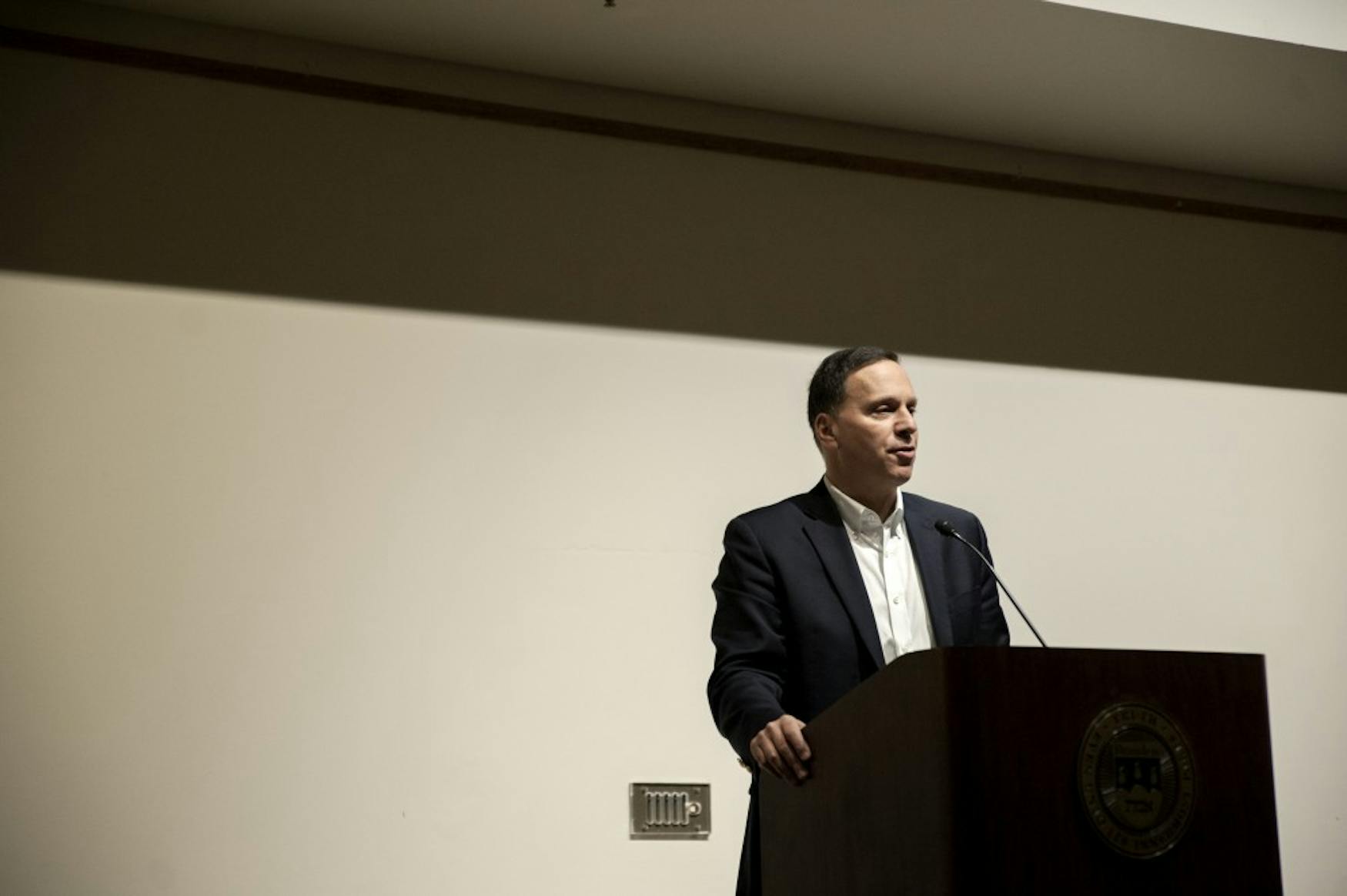Liebowitz talks on Univ. future
Continuing an ongoing dialogue with the Brandeis community, University President Ron Liebowitz held an open meeting on Wednesday night to discuss the University’s future.
Liebowitz opened the meeting with a speech that laid out “broad, strategic areas within which will lie many other specific programs, ideas and recommendations.”
These priorities were the result of 18 months of meeting with Brandeis community members during office hours and small lunches, consulting two experts on the University’s identity and mission and reading 35 self-reflection documents written by “faculty and staff leaders of the institution,” Liebowitz explained.
The first priority Liebowitz highlighted was to become “a newly extraverted institution with regional, national and global connections and impact.” He pointed to the transition Brandeis has experienced in the last two to three decades, during which it “hunkered down” and started “focusing in on itself … instead of looking outside,” moving away from the international character of its founding.
To solve this problem, Liebowitz wants Brandeis to take pride in what makes the University special. Currently, he sees the University as “overly self-critical” and consequently losing the opportunity to share “all the institutional accomplishments with the wider world in order to build relationships and build the reputation of the institution.”
Turning his attention to issues within the University, Liebowitz expressed a deep desire to “redefine the student experience.” Although proud of Brandeis’ academic rigor, the president expressed concern at the “imbalance in the Brandeis experience.”
“Students are incredibly intense, they’re passionate about their academics … but in essence, they are lacking something on the student life side,” Liebowitz said, clarifying that the issue is not a lack of “co-curricular” activities, but rather “what happens in the students’ lives when they leave the academic realm. When they go back to the residence halls, what is there to greet them?”
Liebowitz sees reforming the residential life experience to create “smaller, more meaningful residential communities” as a key solution to this issue. However, he also expressed a desire to unify the entire school with “a single shared school spirit.”
In the area of academics, the president stressed the necessity of adjusting to the recent demographic changes to the University’s student body. “Because it’s diverse,” Liebowitz said of the student body, there are “different learning styles” which the faculty needs to meet with new teaching methods.
Liebowitz also commented on the intense desire he heard from students to learn life skills, like balancing a checkbook. He admitted it’s “something I certainly don’t think about, as an educator, of taking place in college.”
During the Q&A portion of the meeting, Liebowitz revealed that the University is considering switching from the two-semester system to a four-quarter system, creating winter and summer sessions while shortening spring and fall, for financial and academic reasons. In response to a question of whether the University would change its stance on Greek life as a part of improving the student experience, the president said he was not considering recognizing Greek life.
The question of the University’s identity came up twice during the meeting. Although Brandeis’ commitment to social justice made it unique in 1948, according to Liebowitz, such a commitment has become the norm for colleges and universities. Thus, Brandeis must decide how “differentiate” itself to show, as the president put it, that social justice is “part of our DNA.”
Liebowitz also emphasized his commitment to Brandeis’ Jewish heritage, another part of the University’s DNA. He called on the University to “respect and honor our roots,” specifically by making “service … to the American Jewish community” part of Brandeis’ mission. On this point, Liebowitz admitted, he has gotten pushback from those who fear “separating out any student from the rest,” but he reiterated the importance of Brandeis’ identity as “the only secular university founded by the American Jewish community.”
Modernizing the “academic and physical infrastructure” of the University is central to both his desire to improve students’ residential experience and to maintain Brandeis’ standing among respected research universities. He said the University has recently “deferred maintenance,” leading to problems like leaky ceilings and malfunctioning heating systems, which potentially undermines its “status as a major research university.”
On this point, and throughout the meeting as a whole, however, Liebowitz continually reminded the audience of the University’s financial constraints. With an endowment just shy of $1 billion, Brandeis does not have the financial resources of other top universities and has been overspending.
Despite financial constraints, Liebowitz reiterated his belief in the importance of all of the goals laid out during his presentation, and encouraged students, staff and faculty to be involved in the process of shaping and implementing these priorities. This spring, he plans to send out surveys to gauge the priorities of the Brandeis community.
Additionally, the Student Union, Graduate Student Association and the Faculty Senate, among other campus organizations, will be consulted, and specific task forces will be appointed to address key priority areas.
By the start of the 2018-19 school year, Liebowitz hopes to have an “opening set of programmatic plans,” which can then be analyzed financially.
Near the end of the meeting, Liebowitz expressed his desire to hear from Brandeis’ community: “When you’re surveyed, take the time and tell us what you’re thinking. … What you think is central to the future of Brandeis.”



Please note All comments are eligible for publication in The Justice.